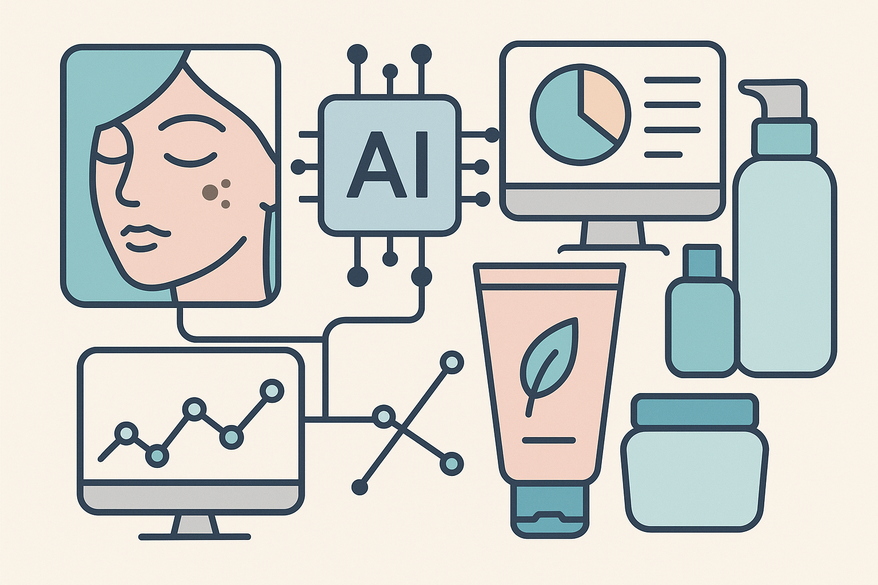AI Skincare Recommendation System: A Complete Guide
Discover how AI skincare recommendation systems use machine learning, computer vision, and analytics to provide personalized skincare routines and product suggestions.

Estimated reading time: 8 minutes
Key Takeaways
- Data-driven insights power ultra-precise skin analysis through machine learning and computer vision.
- Personalized routines evolve with your genetics, environment, and lifestyle.
- Deep learning models categorize concerns—wrinkles, acne, pigmentation—for targeted care.
- Predictive analytics refine product mixes via feedback loops and time-series forecasts.
- Ethical challenges like data privacy and bias underscore the need for transparent practices.
Table of Contents
- Introduction to AI Skincare Recommendation Systems
- Why AI in Skincare Is Gaining Popularity
- Recommendation Systems in the Skincare Industry
- How AI Skincare Recommendation Systems Work
- Benefits and Advantages of AI Skincare Recommendation System
- Challenges and Limitations of AI Skincare Recommendation System
- Real-World Applications and Case Studies of AI Skincare Recommendation System
- Future Trends and Innovations in AI Skincare Recommendation System
- Conclusion on AI Skincare Recommendation System
Introduction to AI Skincare Recommendation Systems
An AI skincare recommendation system uses artificial intelligence—particularly machine learning, computer vision and predictive analytics—to analyze user-specific skin data and preferences. This technology generates personalized routines and product suggestions tailored to each individual. It taps into AI in skincare and personalized beauty AI to remove guesswork and deliver science-backed guidance. AI skincare recommendation systems harness deep learning models, smart algorithms, and large datasets to offer truly bespoke beauty tech.
To see these principles in action and get a hands-on AI analysis of your skin, check out Maxx Report.
Why AI in Skincare Is Gaining Popularity
AI’s rise in skincare stems from its ability to:
- Process vast consumer datasets in minutes.
- Provide precise, data-driven product selections.
- Adapt recommendations as skin changes.
- Replace one-size-fits-all routines with personalized regimens.
This shift toward AI in skincare means faster, more accurate routines backed by research and user data.
Recommendation Systems in the Skincare Industry
In skincare, recommendation systems are digital tools that:
- Collect and analyze user info—skin type, concerns, behavior.
- Use AI models to predict optimal products.
- Deliver tailored product and routine suggestions.
- Move beyond traditional retail’s generic offers.
These systems blend personalized beauty AI with computer vision and analytics to recommend cleansers, serums, and moisturizers uniquely suited to each user.
How AI Skincare Recommendation Systems Work
Underlying Technologies for AI Skincare Recommendation System
- Machine Learning & Deep Learning
- Convolutional Neural Networks (CNNs) like MobileNet, VGGNet, ResNet are trained on thousands of labeled skin images.
- These models extract features—texture, pore size, pigmentation—and classify skin issues.
- Over time, they learn to distinguish fine lines, acne severity, and discoloration.
- Computer Vision
- Uses image processing to assess hydration, wrinkles, redness, and spots.
- Facial landmark detection defines areas (forehead, cheeks, chin) for detailed analysis.
- 3D mapping and multispectral imaging enhance detection of deeper skin concerns.
- Predictive Analytics
- Combines current user data and past outcomes to forecast the most effective product mix.
- Continuously refines recommendations based on user feedback—ratings, surveys, adherence.
- Uses time-series models to predict skin changes with seasons or age.
Data Collection and Input in AI Skincare Recommendation System
Accurate recommendations depend on diverse data streams:
- Direct User Input
- Structured questionnaires capture skin type, sensitivity, lifestyle, allergies. For a deep dive into constructing your perfect skincare ritual.
- Optional surveys track stress levels, diet, sleep patterns.
- Image/Video Capture
- High-resolution selfies taken via smartphones or webcams.
- Guided lighting and positioning ensure consistent snapshots.
- Behavioral Data
- Purchase history: brands, ingredients, price range.
- Product ratings and reviews to gauge satisfaction.
- Adherence patterns: how often users apply recommended items.
- Environmental Data
- Local climate, humidity, temperature.
- Pollution index, UV radiation levels.
- Seasonal variations affecting skin barrier and moisture.
Algorithms and Decision-Making Processes in AI Skincare Recommendation System
AI systems apply various algorithms to turn raw data into actionable advice:
- Skin Condition Scoring
- Regression models assign numeric scores for pores, wrinkles, redness.
- Neural networks map image features to severity scales.
- Scores guide product strength and ingredient concentration.
- Collaborative Filtering
- Groups users with similar skin profiles and routines.
- Suggests products that worked for “look-alike” users.
- Content-Based Filtering
- Matches ingredients and formulations to individual skin analysis.
- Recommends high-hydration serums for dry skin, anti-inflammatory creams for sensitive skin.
Benefits and Advantages of AI Skincare Recommendation System
- Personalized Skincare Advice
- Considers genetics, environment, and lifestyle for ultra-customized routines.
- Adjusts formulas based on ingredient sensitivities and user goals.
- Delivers morning and evening plans with step-by-step guides.
- Increased Efficiency
- Cuts down weeks of trial-and-error searching.
- Streamlines online or in-app shopping with curated product lists. Explore top moisturizer recommendations.
- Automates periodic check-ins to update routines as skin evolves.
- Enhanced User Experience & Customer Satisfaction
- Builds trust through clear, data-backed explanations of each recommendation.
- Improves routine adherence with reminders and progress tracking.
- Boosts brand loyalty by delivering consistent, measurable results.
Challenges and Limitations of AI Skincare Recommendation System
- Data Privacy & Security
- Facial imagery and health data are highly sensitive.
- Systems must comply with GDPR, CCPA, and industry best practices.
- Encryption, anonymization, and secure storage are critical safeguards.
- Model Accuracy & Bias
- Training datasets may underrepresent darker skin tones or rare conditions.
- Biased data leads to skewed suggestions and possible misdiagnosis.
- Ongoing audits and diverse sampling are essential to reduce bias.
- Complexity of Diverse Skin Conditions
- Skin issues like eczema flare-ups or rosacea require dynamic, evolving models.
- Static training sets struggle with transient or rare conditions.
- Continuous model retraining and user feedback loops help address variability.
Real-World Applications and Case Studies of AI Skincare Recommendation System
- Leading Brands & Platforms
- Proven Skincare: AI-driven quiz and photo analysis for routine creation.
- YouCam Makeup: Real-time AR scans to recommend products in-app.
- Curology: Tele-dermatology plus AI to prescribe custom formulas.
- HiMirror: Smart mirror that tracks skin changes and suggests treatments.
- Haut.AI: Enterprise solutions for retailers to deliver personalized beauty tech.
- Tangible Business & User Outcomes
- 30% lift in conversion rates for brands using AI quizzes.
- 25% decrease in product returns when recommendations match skin profiles.
- 40% higher user engagement through personalized push notifications.
- User Feedback & Key Takeaways
- “I finally found a routine that works for my sensitive skin,” says one user.
- Positive reviews cite improved skin clarity in 4 weeks.
- Common requests include more transparency on data use and broader shade representation.
Future Trends and Innovations in AI Skincare Recommendation System
- Real-Time Dynamic Personalization
- Daily skin scans via smartphone sensors to tweak routines on the fly.
- Integration of wearable data (heart rate, sweat composition) for holistic insights.
- Improvements in Data Quality & Model Fairness
- Crowd-sourced datasets spanning all skin tones and conditions.
- New bias-mitigation techniques in deep learning pipelines.
- Expansion into Holistic Beauty & Wellness
- AI that recommends not just topicals, but nutrition plans and stress-management tips.
- Cross-disciplinary platforms linking dermatology, nutrition, and mental wellness.
Conclusion on AI Skincare Recommendation System
AI skincare recommendation systems are transforming how we care for our skin. By combining machine learning, computer vision, and predictive analytics, they deliver:
- Precise definitions of skin condition severity.
- Tailored product and routine recommendations.
- Improved efficiency and user satisfaction.
Challenges like data privacy, bias, and rare conditions must be addressed through ethical data practices and diverse sampling. As AI continues to evolve, consumers can expect smarter, more inclusive skincare solutions.
Explore AI-powered skincare tools today. Begin your AI-driven regimen with customized skincare routine app and embrace data-driven beauty for healthier, happier skin.
FAQ
How does AI analyze my skin?
AI leverages machine learning and computer vision—like convolutional neural networks—to assess texture, hydration, and pigmentation from images. These models classify concerns such as wrinkles or redness and recommend targeted solutions.
Is my personal data secure?
Reputable AI skincare platforms follow GDPR and CCPA guidelines, using encryption and anonymization to protect your facial imagery and health information. Always review a provider’s privacy policy before sharing sensitive data.
Can recommendations adapt over time?
Yes. Predictive analytics and user feedback loops allow the system to refine routines based on new data—seasonal changes, skin improvements, or ingredient sensitivities.
Are AI-driven tools suitable for all skin types?
While AI can cater to diverse skin tones and conditions, performance depends on training data breadth. Look for platforms that use crowd-sourced, inclusive datasets to ensure fair recommendations.





